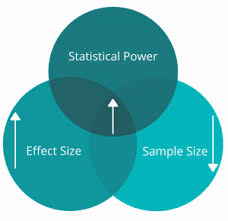Power Analysis Help: Expert Assistance for Your Research Needs
Are you in need of power analysis help? Power analysis is a critical step in the design of a research study, determining the minimum sample size required to detect an effect of a given size with a certain level of confidence. However, conducting a power analysis can be daunting, especially for those unfamiliar with statistical methods or software tools.  At phdcapstonedissertations.com, we specialize in providing professional writing services, including assistance with power analysis. This article will guide you through what power analysis entails, its importance, and how we can help ensure your research is methodologically sound.
At phdcapstonedissertations.com, we specialize in providing professional writing services, including assistance with power analysis. This article will guide you through what power analysis entails, its importance, and how we can help ensure your research is methodologically sound.
What Is Power Analysis?
- Statistical Power: The probability of correctly rejecting the null hypothesis when it is false (typically set at 80% or 90%).
- Effect Size: The magnitude of the effect being studied, such as the difference between group means or the strength of a correlation.
- Significance Level (α): The probability of rejecting the null hypothesis when it is true, commonly set at 0.05.
- Sample Size: The number of participants or observations needed to achieve the desired power level.
Why Is Power Analysis Important?
Power analysis is more than a statistical exercise; it is a cornerstone of ethical and effective research design. Here’s why:
- Prevents Underpowered Studies – An underpowered study is unlikely to detect a true effect, wasting time, resources, and participant effort. This can lead to inconclusive results, making your research less credible.
- Minimizes Overpowering – Conversely, using too large a sample unnecessarily expends resources and may lead to statistically significant findings lacking practical significance.
- Supports Funding Applications – Many funding agencies and institutional review boards require power analysis as part of research proposals to ensure feasibility and ethical design.
- Enhances Result Interpretation – By accounting for effect size and sample size, power analysis helps researchers contextualize findings, distinguishing true effects from statistical artifacts.
Challenges in Conducting Power Analysis
- Complex Calculations: Power analysis often requires advanced statistical knowledge to understand and implement correctly.
- Uncertainty in Effect Sizes: Estimating effect sizes can be challenging, especially in novel research areas.
- Software Proficiency: Tools like G*Power, SPSS, or R require a learning curve, which can be time-consuming for non-specialists.
- Balancing Components: Adjusting one parameter (e.g., sample size) impacts others, making optimization tricky.
How We Help with Power Analysis
- Customized Analysis for Diverse Study Designs – Whether you’re conducting a simple t-test or a complex multivariate analysis, we tailor the power analysis to suit your methodology. We work with study designs including:
- Experimental and observational studies
- Longitudinal and cross-sectional analyses
- Regression and correlation models
- Clinical trials
- Accurate Effect Size Estimation – Using existing literature, pilot studies, or simulation techniques, we help you estimate realistic effect size, ensuring your power analysis is grounded in credible assumptions.
- Software Expertise – Our team is proficient in industry-standard software, including:
- G*Power: Ideal for basic power analysis tasks.
- SPSS and SAS: Suitable for more comprehensive statistical modeling.
- R and Python: Customizable for advanced or unconventional study designs.
- Transparent Reporting – We provide detailed documentation of the power analysis process, including:
- The rationale for chosen parameters
- Assumptions and limitations
- Visualizations, such as power curves, to illustrate findings
- Consultation Services – Besides conducting the power analysis, we offer consultation sessions to explain the results and their implications for your study design.
Benefits of Using Our Power Analysis Services
- Expertise Across Disciplines – Our team includes statisticians and subject-matter experts familiar with a range of academic fields, ensuring your analysis aligns with disciplinary norms.
- Time Efficiency – We handle the technical details, freeing you to focus on other aspects of your research or academic responsibilities.
- Enhanced Credibility – A well-conducted power analysis demonstrates methodological rigor, increasing the likelihood of publication or approval by ethics boards.
- Affordable and Scalable Options – We offer flexible pricing and service tiers to accommodate individual researchers, academic institutions, and corporate clients.
Power Analysis in Action: A Case Study
Our Approach:
- Conducted a literature review to estimate effect sizes for similar interventions.
- Used G*Power to perform a priori power analysis for the primary outcome measure.
- Simulated data in R to validate assumptions and refine the sample size calculation.